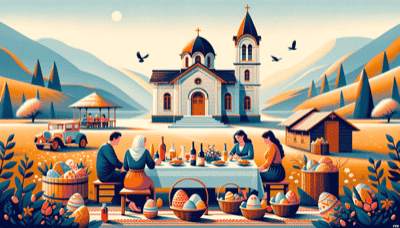We're here to help you keep count of the days to or since a date. Just click the button below and enter your chosen date to get started. Also choose the suggested days or search for a special day above #countingthedays

Easter Sunday in Albania is a significant religious holiday, predominantly celebrated by the Christian community, comprising both the Orthodox and Catholic denominations. Given the religious diversity of the country, which also includes a substantial Muslim population, Easter is not as universally observed as in some other predominantly Christian countries.
Religious Services: The history of Easter in Albania is deeply rooted in Christian traditions. Churches hold special services starting from Holy Week leading up to Easter Sunday, with Good Friday being a day of mourning and Easter Sunday a celebration of the resurrection of Jesus Christ.
Fasting: Many Christians observe Lent leading up to Easter, involving fasting or giving up certain luxuries as a form of penitence.
Egg Decorating: One common tradition is the coloring of eggs, usually red to symbolize the blood of Christ. These eggs are often blessed in church services and then used for traditional games or given as gifts.
Greeting: People greet each other with phrases like "Krishti u ngjall!" or "Christ is risen!" to which the response is typically "Vërtet u ngjall!" or "Indeed, He is risen!"
Family Gatherings: On Easter Sunday, those who observe the holiday often attend church services in the morning and then spend time with family and friends. It's common for families to have a festive meal together.
Food: Traditional foods served on Easter include lamb (a symbol of Christ), breads like 'paska' (an Eastern European sweet bread), and other festive dishes.
Public Holiday: While it's a day off for those who practice Christianity, not all businesses may be closed since Albania maintains a separation between religion and state. The extent to which public life slows down can vary depending on regional demographics.
In summary, Easter Sunday in Albania is marked by religious observances, family gatherings, traditional foods, and cultural practices such as egg decorating. The day reflects both religious significance for Christians and an opportunity for family reunions and communal meals among those who celebrate.